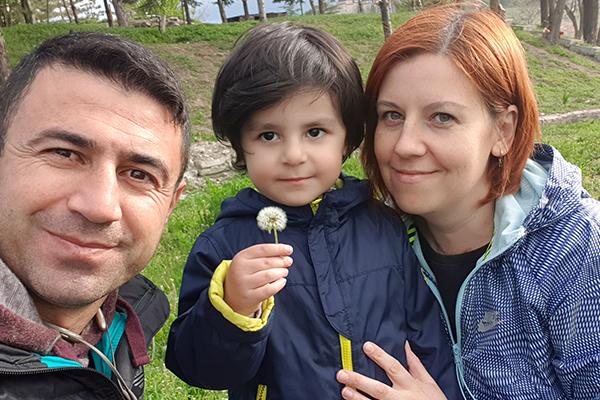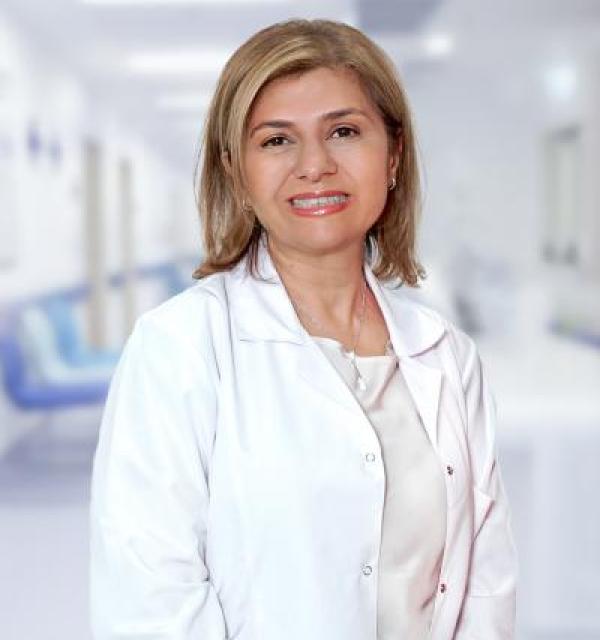Treated for Asthma for Two Years, But Turns Out to Have a Tumor in Her Trachea
Hilal Karaman, the mother of two children, started to experience shortness of breath about two years ago. The young woman's complaints were thought to be psychological. Karaman, who was increasingly short of breath, was diagnosed with asthma after a while. After 2 years of using asthma medication, Hilal Karaman's tomography result shocked everyone involved. The young woman, who was found to be unable to breathe due to the tumor covering 95 percent of the trachea, came to Istanbul. She recovered after the surgery she underwent here.
Hilal Karaman, 36, who lives in Eskişehir, started to experience shortness of breath exactly 2 years ago. The complaints of the young woman whose husband served as a military officer in Tunceli were thought to be psychological. The young woman, whose shortness of breath continued to increase day by day, was diagnosed with asthma this time. The young woman, who started using asthma drugs, became unable to climb the stairs over time. The young woman, who took her breath again in the hospital, could not pass the respiratory test. Karaman, whose complaints continued to increase despite asthma drugs, was screened with tomography this time. The result surprised everyone who saw it.
The young woman had a 3-centimeter tumor in her trachea that blocked 95 percent of her trachea and involved the right half of her thyroid. The young woman, who learned of her illness, came to Istanbul for surgery. The head of the Chest Surgery Department of Yeditepe University Hospitals Prof. Dr. Sina Ercan examined the young woman and took her to the operating room. The young woman, who had difficulty speaking due to shortness of breath, regained her health after about 7 hours of surgery. Karaman said she came home singing.
"Undergoing Surgery During the Pandemic Was Scary"
Stating that her respiratory complaints increased even more when she climbed the stairs, Hilal Karaman described her difficult days as follows: "I have a 3.5-year-old son. I could not carry him in my arms. I was very surprised when I first heard that I had a tumor in my trachea. I was not expecting this. I was thinking that my asthma drugs would be increased, and I would recover. It was decided that my surgery could not be performed in Eskişehir due to the coronavirus outbreak. So, they said they would refer me to a sterile hospital in Istanbul and I came to Istanbul. I am thankful that I am doing well."
"I Could Not Climb the Stairs, But Now I Can Run"
Stating that she returned home after the surgery singing, Hilal Karaman said, "I am a person who loves to talk. When I was telling people something, I was thinking, 'Do they realize that I can barely breathe?' This made me very sad, believe me. I had surgery and recovered my health. I was singing on my way home for about a week after surgery. My little boy said to me after the surgery, 'Mommy, can we run together now?' I always said, "I cannot run, dear." After the surgery, we played in the park and ran up the stairs. Now I am very happy," she said.
Stating that his wife had intense shortness of breath for 2 years, Acar Selçuk Karaman (38) said, "My wife's quality of life decreased, she could not breathe, she could not climb or even walk. We went everywhere by car."
"The Patient Was at Risk of 'Drowning'"
Chest Surgery Specialist at Yeditepe University Koşuyolu Hospital, who operated on the young woman, Prof. Dr. Sina Ercan reminded that Hilal Karaman was operated on in the last stage of the disease. Reminding that there are unfortunately delays in the diagnosis of such tumors from time to time, Prof. Dr. Sina Ercan said, "When Hilal Karaman came to us, the disease was at the final stage. The patient's trachea was 95 percent blocked. Diagnosis of tracheal strictures can be delayed. The findings can be interpreted in different ways. It was thought that Hilal Karaman's shortness of breath could be psychological. Later, when the complaints did not pass and continued, asthma was diagnosed. Many patients with this condition are confused with other diseases that can cause shortness of breath, such as asthma or COPD. She had been on drugs for a long time, but obviously, that did not help."
"There Will Be a Post-Surgical Radiotherapy Process"
Yeditepe University, Faculty of Medicine, Dean Prof. Dr. Sina Ercan, explained that the biggest risk in the surgery is the damage to the vocal cords, and gave the following information about the surgery:
"The biggest risk is that the tumor cannot be completely removed, damaging the nerves leading to the vocal cord. Therefore, it is important to remove it completely the first time and to protect the nerves and vocal cord functions. Our patient's tumor is more than 3 centimeters in diameter. In an adult, the tumor occupied 95 percent of the trachea, given that the diameter of the trachea was around 2 centimeters. These patients are given radiotherapy treatment after surgery, and the possibility of a long-term recurrence of the disease is also eliminated. Hilal Karam has no problems at the moment, we do not expect her to experience this disease again."
How Were the Vocal Cords Preserved?
ENT and Head and Neck Surgery Specialist Prof. Dr. Zeynep Alkan, on the other hand, stated that they protect the nerves that control the movement of the vocal cords while removing the tumor affecting the right half of the trachea and thyroid. Yeditepe University Kosuyolu Hospital specialist Prof. Dr. Zeynep Alkan, explaining that various vocal cord problems can be experienced in such surgeries, said, "We tried to preserve the mobility of the vocal cords while removing the tumor. Along with the tumor, a 3.5-centimeter portion was removed from the trachea. Then, healthy tissues were sutured end-to-end. The biggest risk for us in this surgery was damage to the nerve that goes to the vocal cords. But we were able to protect it by using the nerve monitor and by finding and following the nerve with our eyes, separating it well from the tumor. Now our patient can adjust her breathing and even sing. Vocal cord paralysis would have been inevitable if the nerve leading to the vocal cords had not been preserved. In unilateral vocal cord paralysis, hoarseness, difficulty in swallowing, leakage of food into the esophagus and related pneumonia attacks; in bilateral paralysis, breathing difficulties could be seen".
”


